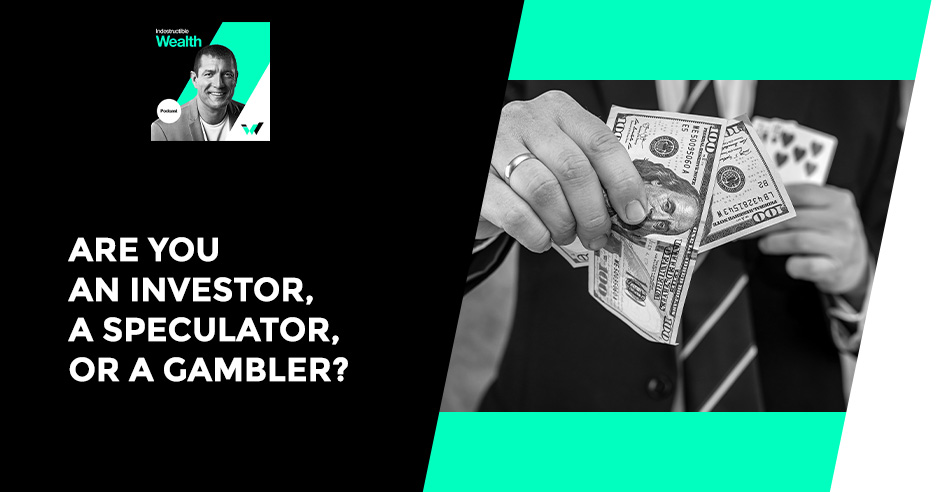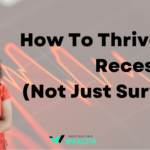
Knowing which of these archetypes you are in any given financial situation is key to uncovering your motivation, and more meaningfully understanding the potential outcomes of the risks you take.
—
Listen to the podcast here
Are You An Investor, A Speculator, Or A Gambler?
Buying a financial asset is commonly referred to as investing. This is not at all true. Just because you buy an asset doesn’t automatically give you the title Investor. There’s a big difference between an investor, a speculator, and a gambler. When I learned how to be a real investor, the game completely changed for me. It brought clarity to my plan and long-term sustainable growth to my financial life. Being clear on which one you are in a given situation will guide you on how to grow wealth was certainly and not guesswork. The big question is, are you an investor, a speculator, or a gambler, or do you have a part of all three? Let’s dive in and figure this out.
My childhood best friend and I met in nursery school. Our first acquaintance was that we would meet up, butt heads, and stare at each other. We knew that we were fighting for the leadership of the class, and that’s as a five-year-old. That’s how we intelligently and emotionally handled that rivalry. We’re good friends. We don’t talk much on the phone. I don’t know, maybe that’s a guy thing. Is that a guy thing? I think it’s a guy thing.
He called me. I couldn’t send it to voicemail. It wasn’t a great time. You can send him to voicemail but he’s calling me. He never calls me. It’s got to be something. I answer. He’s like, “How are you doing?” I’m like, “Get to the point. Why did you call me? You never call me.” He’s like, “I’m coming to your mom and dad’s 50th wedding anniversary,” and he’s coming in from Puerto Rico.
He’s like, “I’m bringing this girl that I’ve been dating. Did you know that I was dating her?” He mentioned it a little bit in one of the text chats we had with all the high school buddies, but he didn’t say anything other than that. I have no idea. I know nothing about her. He said, “That’s the problem. I need you to play along. I need you to act like I’ve been talking about her for a long time so she feels like I’m into her.” I’m like, “Okay. Tell me her name. What does she do? How many siblings? Give me all this stuff.” I agree. I’m going to play along. We’re going to make her feel like he’s been talking about her every day. I won’t probably go that far.
He then goes, “What about Ethereum? You told me to buy it back when it was $1,000. I wanted to get your take on it because I don’t like what’s happened lately.” It’s almost tripled, even with the correction and the dip compared to where I told you to buy in. You just need to calm the fuck down. I was like, “It’s not going to go up and up. Volatility is the price that you have to pay for outsize gains. You wanted to go up super-fast, but you don’t ever want it to drop.” He’s like, “I loved it when it kept going up and up.” I’m like, “We all do.”
Volatility is the price that you have to pay for outsized gains. Share on XHe inspired me for this episode because I want to talk to you guys about the difference between an investor, a speculator, and a gambler. I’ve been all three and there are parts of me even now that are all three. It’s understanding what the difference is between the three and knowing where you mostly predominantly fit in. This isn’t a criticism. It’s not negative. There’s not right. There’s not wrong. If we strive to be builders of long-term sustainable wealth, we need to have a big majority of our percentage of us in the investor quadrants.
This is a post I read on a social media network. This is a girl whose main focus is on promoting stocks. Here’s what she says. “Don’t let them fool you. Investing in the stock market is easier than you think. All you need is a brokerage account. That’s the account used to buy stocks and bonds. There are four steps to investing. 1) Choose an online brokerage platform. 2) Open a brokerage account and link your bank account. 3) Move money from your bank to your brokerage account. 4) Buy stocks, bonds, and funds. 5) Rinse and repeat. You’re an investor.”
That’s the end of her post. I call it total and complete BS. It gets me riled up because it’s bad. I don’t even know what else to say. I’m going to tell you what I think about this scenario that she just described. You are not a fucking investor. You’re a speculator. By any means, it’s not negative. It’s not accurate to say you’re an investor.
Let me explain the difference between an investor, a speculator, and a gambler. I think you guys have a pretty good idea of what a gambler is, but we’ll dive in. An investor gets in on the early stages. They’re the first to own the asset and they put the time, thought, and energy into understanding what they’re buying and that they’re getting in at a price below market value.
An investor almost always holds for the long term and if the price should drop below what the market value is, they don’t panic sell. They typically will buy more because they understand that the price is just a short-term indication of market volatility and doesn’t necessarily represent the actual value of the asset. Speculators come in later and they only buy when something’s typically moving up. They have no idea what they’re buying. They haven’t done any homework and are simply betting that someone will pay them more than what they bought it for down the road.
The primary difference between speculators and gamblers is that speculators play in the financial markets. They’ve bought financial assets before. They typically do only play if there is a positive expected outcome. What’s a positive expected outcome? That simply means that there is a greater chance that what they’re buying is going to go up than it is going to go down. However, speculators are simply buying something primarily based on price and movement. Speculators oftentimes can be very short-term in nature. If an asset drops in price, not understanding what they own, oftentimes, they’re going to panic sell.
We saw this big time in the crypto markets. There was a post, a tweet, or whatever it was by Elon Musk, and he set off a massive speculatory panic sell. Everybody who had just bought in because it was going up didn’t understand crypto. They didn’t understand the game they were playing. They didn’t understand what the underlying value or usage was. When the price started dropping, “The sky is falling. I got to sell.”
The investors that did understand started buying more as the price dropped. That was me. There were several coins that, when the price started tanking, I was in there scooping them up at lower prices and getting a better value for my money. Gamblers will typically show up late in the cycle, and they buy extremely risky assets that, over the course of a multi-year period, have almost no chance of increasing in price. They have what’s a negative expected outcome.
That’s primarily the difference between speculators and gamblers. The only way to win in gambling is if you win early, AKA get lucky and then stop. How often do gamblers stop once they won? Come on. That doesn’t happen. This is why gamblers typically, at some point, they always go bust. If you want to see a movie about a complete and total degenerate gambler, watch Uncut Gems. I don’t know if I liked it. It’s on Netflix who’s starring Adam Sandler. He’s this guy. He has a jewelry store, and he got this gem. I don’t want to ruin the plot or the whole movie for you.

Gambler: The only way to win in gambling is if you win early, aka get lucky, and then stop.
If you haven’t seen it, I don’t know if you should see it. You might not be that happy that you saw it. He’s one move after another. You think he’d learn his lesson, settle in, and do business. He’s got to put a bigger wager on. You’ll see as the movie unwinds how the story does not ever go the way the gambler hopes it’s going to go. They rarely have ever played in financial markets. This was the case during the COVID lockdowns. A lot of people came in and started buying stocks and crypto. They were the ones driving up the prices in AMC and in-game stock that caused that huge run-up in those stock prices.
They’re buying Dogecoin left and right. They got their stimulus checks in and they’re like, “I want to go play. I want to go gamble with it. I’m going to go buy some stocks. I’m going to buy some crypto.” There is very little underlying value that is supporting these deals. These are based on hype and memes. In a few years, if we were to ask the question, “What will they be worth?” it’s going to be very hard press for anybody to legitimately convince me that they’re going to be that much above zero.
I’ve been to all three of these. I’ve been an investor, a speculator, and a gambler. Let me give you some examples of when I’ve been an investor and when I buy houses for below market, I fix them up and then I rent them out to a tenant and then I hold them long-term with bank finance money. I’m an investor. Years ago, I listened to a podcast by a financial guru. He had a great, shortened, and concise podcast. Every episode of them was like seven minutes top. It was pretty cool. He was selling properties as part of his platform. That’s one of the ways that he generated income from his platform.
I ended up buying a property from him out in Arizona. I bought it for $60,000 and I put $20,000 in to fix it up. It wasn’t in that great a shape. I’m all in for $80,000. I went to my local bank and said, “I want to refinance or get all my cash back out as I possibly can.” They go in and say, “We got to determine the fair market value of this property with an appraisal.”
They went in and appraised it for $90,000. I was in it for $80,000 in cash and it was worth $90,000. I had $10,000 in equity. They gave me a loan for 75% of the appraised value. I got about $68,000 cash back out. I had that then as a note. That was a mortgage payment that I had to make. I’m only in it for $12,000 of my own cash. I collect rent for five years at $900 a month. It started off at $800 or $850. I was a little disappointed. The rent wasn’t as strong as I was hoping it would be when I bought it. The property manager said, “Hold it. This area’s going to go up. We’re buying here. Don’t sell it.”
I held it. Sure enough, years later, I checked the value. The market’s pretty hot and the comps are showing anywhere from $150,000 to $220,000. We’re going to put it on the market for $210,000. I made it for $80,000 total and only $12,000 of that is my cash that’s sitting in there. That’s being an investor. I bought something, I was first in it, I fixed it up, I held it long term, and I utilized bank debt. I collected the rent the whole time. It was positive cashflowing. The property not only provides the monthly cashflow from the rents. It’s also amortizing the loan. It’s paying down the loan every month through the rent that is coming in.
That’s a further increase in my net worth and then it appreciates and goes like crazy. Not all my properties have gone up that much in the last few years. This is a great example. That was an investor move. I wasn’t buying that with any speculation hoping that the price of the asset would go up. In fact, in the last few years, I’ve had it in my net statement. It is $90,000. I didn’t even check it. I wasn’t even looking at it. All I was looking for was the cashflow that was coming in every month.
I’m going to sell it because the price of the asset is at a point where I feel that it’s time to cash it out and the rents haven’t caught up yet with the increase in the price. I need to sell that, liquidate the equity out of that, and move that to something else. I’m not sure what it’s going to get moved to but it’s going to something else.
When I buy into a fund, which is called syndication, that fixes up abandoned Kmarts, converts them to self-storage projects, and eventually sells out to a large fund. Usually, it’s a 3 to 5-year hold time. I’m an investor. You guys start to see the difference. When I bought tech stocks, high-growth companies, and cryptocurrencies like Bitcoin, Ethereum, and the Altcoins that have underlying usage value, I was a speculator. I’m buying those in the hopes that the price will go up and somebody will pay more at some point in the future when I decide to sell.
Here’s the difference. When I buy well-researched pre-IPOs, IPO means Initial Public Offering, I’m getting in the very early stage of the company. I’m one of the first to own the company and own that asset. I’m not a speculator nor a gambler because I’m first in. I’m buying something that is well below the market price. The value is much higher than the market price. I’m an investor in that situation.
When I go to the casino, I play blackjack. I enjoy doing it on occasion with friends. I’m a gambler. When I play Pot-Limit Omaha poker, it’s a very volatile game that I play with friends on Friday nights, I’m a gambler. When I place a sports wager, which I do not do that often, I’ll put bets on the Browns or the Buckeyes. Occasionally, I win. Occasionally, I lost, probably with the deuce, the 10% you have to pay when you lose. I probably lost in that game.
Over the course of time, I’ve won some, I’ve lost some, but I’m probably down overall. If I were to buy AMC, GameStop, or Dogecoin because other people bought it, they’re buying it and the price looks like it’s just going up and I have Fear Of Missing Out, FOMO, which I have not bought any of those three. I would also be a gambler in that situation because, over the long haul, I don’t have any chance of winning. When you go to the casino, you do not have any chance of winning over the course of time if you were to stay. I can go in for 1 hour, 2 hours, or 3 hours. I can put some big bets down, win and I can get lucky.
That certainly happens to a lot of people. If they keep playing because the odds are negative in their favor even with a negative 2% win rate. The casino always has the odds. Over the course of time, if you continue playing, you’re going to lose. It’s an inevitability. That’s what I want you to consider as far as what you are. This platform is about helping you to develop yourself into an investor and do some speculation.
I’m not totally against speculation. There are parts of your assets and portfolio that need to be allocated toward speculative bets. Wall Street says, “Put all your money into stocks and bonds and hope for them to go up.” That’s not a way to create indestructible wealth. That is not a way to build a long-term sustainable strategic plan. That can be part of your plan, but it never should be all of it.
Putting all your money into stocks and bonds and hoping for them to go up is not how you create indestructible wealth. That can be part of your plan, but it never should be all of it. Share on XYou want to have a good percentage mix of the investor side of you. Mix in the speculative nature side of you. Put that in there as well into your plan and the right stage through my seven-step strategic process. I tell you when you want to speculate. The gambler can be a very small percentage. That’s for fun. That’s for entertainment. I’m not against that. A few percent of your portfolio in gambling is okay. I’m not going to judge you if you’re doing it responsibly.
A lot of people can’t do it responsibly and they don’t know when to stop. If you can, you know yourself, your nature, and that you can discipline yourself to do it right, then go for it. Have some fun. Do some gambling. Remember, no one is right and no one is wrong here, but which do you desire to be? Do you want to be the investor, the speculator, or the gambler?





